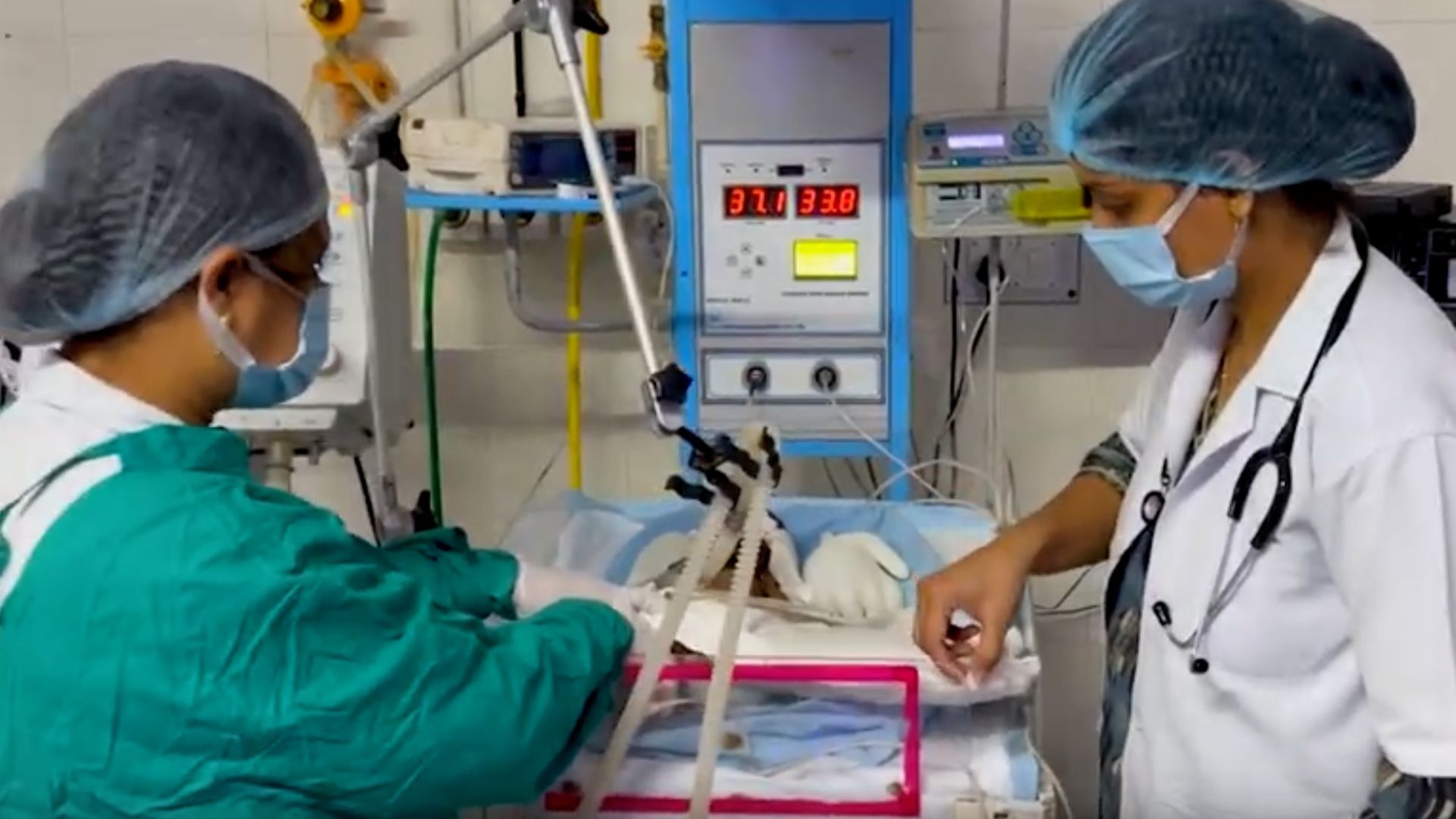World
Newborn Girl Buried Alive Found in Uttar Pradesh, Dies After Rescue

A newborn girl, later named Pari, was discovered buried alive in a rural area of Shahjahanpur, Uttar Pradesh, last month. The alarming discovery was made by local pig farmer Shyam Babu, who found her arm protruding from the mud near a river. Despite the horrifying circumstances, Pari was alive, wrapped in a towel and barely breathing, covered in dirt and suffering from injuries.
Babu’s instinctive response led him to raise the alarm, prompting a crowd to gather at the scene where a local police officer began the delicate rescue operation. After unearthing her from approximately one foot of soil, the officer and bystanders could hear Pari’s weak cries. She was rushed to Shahjahanpur Medical College for urgent medical care, where doctors discovered she was suffering from severe infection, respiratory distress, and other critical conditions.
As local authorities began their search for Pari’s parents, they proposed several theories regarding her abandonment. Officer Gourav Tyagi highlighted three possibilities: her parents might have believed she had died and buried her according to local customs; they could have abandoned her due to a birth defect known as syndactyly; or she might have been discarded due to her gender, which is a significant issue in India where a preference for male children persists.
Dr. Rajesh Kumar, a pediatrician with two decades of experience in Shahjahanpur, shared his observations of similar cases involving girls but noted he had never seen a boy left in such a dire situation. “I have never seen a boy in such a situation… left alone and abandoned,” he stated.
In the neonatal intensive care unit where Pari was placed, her condition was initially critical. Doctors noted she arrived with a blue face, dangerously low body temperature, and unrecordable blood pressure. Yet, against the odds, medical staff found hope. “Miracles do happen,” Dr. Kumar remarked, indicating the dedication of the hospital staff who treated Pari as if she were their own child. They named her Pari, meaning “angel” in Hindi.
Shahjahanpur is a predominantly rural district, with traditional values deeply embedded in its culture. The preference for sons is prevalent, as boys are often viewed as carriers of family lineage and property. In contrast, girls are seen as financial burdens, particularly due to the longstanding tradition of dowry, which remains an issue despite being outlawed in India.
Community member Nanhe Singh expressed the societal pressures faced by families, particularly women, to bear sons. “A woman faces a lot of difficulty. They do not want girls, so the woman goes to temples and does rituals to have a boy,” he explained.
Despite laws prohibiting sex-selective abortions, the practice persists, driven by cultural biases. Kamaljeet Kaur, a health volunteer in the region, described the systemic nature of gender discrimination, stating, “It happens rampantly here.” Women who give birth to daughters often experience severe repercussions, including abuse and isolation.
The distress surrounding Pari’s situation is not isolated. Reports of abandoned infants in Uttar Pradesh continue to emerge. In November 2022, another girl was found abandoned by the roadside and later survived, while another baby girl was discovered dead in a garbage dump.
After a hopeful initial response, Pari’s health deteriorated rapidly. Doctors faced increasing challenges as necrosis set in, and she required oxygen support and blood transfusions. Tragically, after several weeks of intensive care, it was confirmed that she had died. Nurse Sarita Singh, who cared for Pari, shared the heartbreak of her passing: “It was hard to unplug all the monitors and let the baby go. We were her family.”
Efforts to address the gender imbalance in India have been underway for years. In 2015, Prime Minister Narendra Modi launched the “Beti Bachao, Beti Padhao” campaign aimed at improving the status of girls. While there have been noted improvements in the sex ratio and enrollment of girls in education, critics argue that the campaign’s impact has not been deeply felt in rural communities.
Activist Sunita Aralikar, who survived a similar experience as a newborn, emphasizes the need for societal change. “Creating opportunities for female success is the key to shifting perceptions,” she stated, calling for a collective effort to empower girls.
As the investigation into Pari’s case continues, local authorities remain committed to finding answers. The tragedy serves as a sobering reminder of the cultural challenges that still exist in India regarding gender bias. For Babu, the man who found her, the experience was life-changing. He expressed hopes for Pari’s future before her death, stating, “I wanted to meet her in the future. Strong, growing, healthy.”
The silence surrounding her death reflects the broader societal issues at play, with many wondering what can be done to alter the course for future generations of girls in India.
-

 Lifestyle5 months ago
Lifestyle5 months agoLibraries Challenge Rising E-Book Costs Amid Growing Demand
-

 Sports4 months ago
Sports4 months agoTyreek Hill Responds to Tua Tagovailoa’s Comments on Team Dynamics
-

 Sports4 months ago
Sports4 months agoLiverpool Secures Agreement to Sign Young Striker Will Wright
-

 Lifestyle4 months ago
Lifestyle4 months agoSave Your Split Tomatoes: Expert Tips for Gardeners
-

 Lifestyle4 months ago
Lifestyle4 months agoPrincess Beatrice’s Daughter Athena Joins Siblings at London Parade
-

 Science4 months ago
Science4 months agoSan Francisco Hosts Unique Contest to Identify “Performative Males”
-

 World4 months ago
World4 months agoWinter Storms Lash New South Wales with Snow, Flood Risks
-

 Science5 months ago
Science5 months agoTrump Administration Moves to Repeal Key Climate Regulation
-

 Business5 months ago
Business5 months agoSoFi Technologies Shares Slip 2% Following Insider Stock Sale
-

 Science5 months ago
Science5 months agoNew Tool Reveals Link Between Horse Coat Condition and Parasites
-

 Sports5 months ago
Sports5 months agoElon Musk Sculpture Travels From Utah to Yosemite National Park
-

 Science5 months ago
Science5 months agoNew Study Confirms Humans Transported Stonehenge Bluestones








